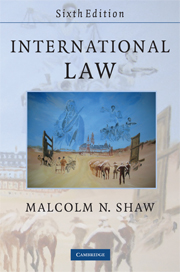Book contents
- Frontmatter
- Contents
- Preface
- Table of cases
- Table of treaties and selected other international instruments
- List of abbreviations
- 1 The nature and development of international law
- 2 International law today
- 3 Sources
- 4 International law and municipal law
- 5 The subjects of international law
- 6 The international protection of human rights
- 7 The regional protection of human rights
- 8 Individual criminal responsibility in international law
- 9 Recognition
- 10 Territory
- 11 The law of the sea
- 12 Jurisdiction
- 13 Immunities from jurisdiction
- 14 State responsibility
- 15 International environmental law
- 16 The law of treaties
- 17 State succession
- 18 The settlement of disputes by peaceful means
- 19 The International Court of Justice
- 20 International law and the use of force by states
- 21 International humanitarian law
- 22 The United Nations
- 23 International institutions
- Some useful international law websites
- Index
23 - International institutions
Published online by Cambridge University Press: 05 June 2012
- Frontmatter
- Contents
- Preface
- Table of cases
- Table of treaties and selected other international instruments
- List of abbreviations
- 1 The nature and development of international law
- 2 International law today
- 3 Sources
- 4 International law and municipal law
- 5 The subjects of international law
- 6 The international protection of human rights
- 7 The regional protection of human rights
- 8 Individual criminal responsibility in international law
- 9 Recognition
- 10 Territory
- 11 The law of the sea
- 12 Jurisdiction
- 13 Immunities from jurisdiction
- 14 State responsibility
- 15 International environmental law
- 16 The law of treaties
- 17 State succession
- 18 The settlement of disputes by peaceful means
- 19 The International Court of Justice
- 20 International law and the use of force by states
- 21 International humanitarian law
- 22 The United Nations
- 23 International institutions
- Some useful international law websites
- Index
Summary
Introduction
The evolution of the modern nation-state and the consequent development of an international order founded upon a growing number of independent and sovereign territorial units inevitably gave rise to questions of international co-operation. The first major instance of organised international co-operation occurred with the Peace of Westphalia in 1648, which ended the thirty-year religious conflict of Central Europe and formally established the modern secular nation-state arrangement of European politics. Over a century later the Napoleonic wars terminated with the Congress of Vienna in 1815, marking the first systematic attempt to regulate international affairs by means of regular international conferences. The Congress system lasted, in various guises, for practically a century and institutionalised not only the balance of power approach to politics, but also a semi-formal international order.
Until the outbreak of the First World War, world affairs were to a large extent influenced by the periodic conferences that were held in Europe. The Paris conference of 1856 and the Berlin gathering of 1871 dealt with the problems of the Balkans, while the 1884–5 Berlin conferences imposed some order upon the scramble for Africa that had begun to develop. These, and other such conferences, constituted an important prelude to the establishment of international institutions, but became themselves ever more inadequate to fulfil the job they had been intended to do.
- Type
- Chapter
- Information
- International Law , pp. 1282 - 1331Publisher: Cambridge University PressPrint publication year: 2008



